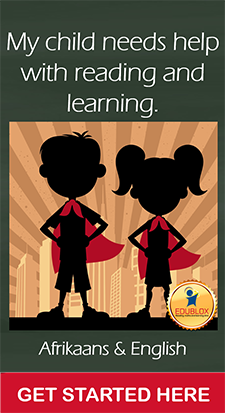

“A severe reading problem may be described as dyslexia, however what’s more important is knowing how these problems can be solved and that there is hope,” says Susan du Plessis, Edublox Director of Educational Programmes.
Switching the letters ‘b’ and ‘d’ or reading the word ‘bog’ instead of ‘dog’ are well-known as typical signs of dyslexia. When children are labelled dyslexic their failure at school is often excused because their problem is considered incurable. People may say that their brain is “wired” in a certain way and it cannot be changed. Du Plessis encourages parents not to give up on their children.
A label for a cluster of symptoms
“Dyslexia is just a label for a cluster of symptoms of reading and spelling problems. The science of neuroplasticity proves that the brain can change. Often what appears to be dyslexia is a lack of certain cognitive skills which include laterality, form discrimination, auditory sequencing and phonemic awareness. If these cognitive skills are practised, a reading problem may become a thing of the past,” say du Plessis.
Even if a child is performing above average at school, compared to international education standards their relative ability is somewhat deceiving. The Progress in International Reading Literacy Study (PIRLS) comparing the reading abilities of Grade 4 children in 40 countries ranked South Africa worst in 2006. A follow up study in 2011, which found Hong Kong to achieve the best standard globally, revealed that our Grade 4 learners were “still performing at a low level overall on an easier assessment compared to their counterparts internationally.”* Research conducted by Edublox in Singapore last year confirmed this concerning situation. “A child whose reading level is considered acceptable for their age in South Africa may be diagnosed as dyslexic in Singapore,” says du Plessis. “A diagnosis of dyslexia is therefore relative to the specific country and environment. Instead of limiting academic performance with a loosely-defined label we should focus on developing potential.”
A case study
The mother of a nine-year-old girl who was diagnosed with severe dyslexia had been told that there was no hope for her child’s academic success. “I was extremely worried when she had to copy ‘discover’ and wrote, ‘coversid’. How could she ever manage to write exams next year in Grade 4? Whenever she read the letters would move on the page,” says her mother. According to du Plessis, this is a sign of a severe reading problem. After a ten day intensive programme in cognitive development, the Grade 3 learner had overcome her first hurdle and informed her mother that the letters had stopped moving. “She has much more self-confidence and is actually enjoying reading now,” reports her mother. As her cognitive skills are further strengthened with exercises that ‘build’ her brain she will be able to beat her reading difficulties completely, says du Plessis.
*http://www.up.ac.za/media/shared/Legacy/sitefiles/file/publications/2013/pirls_2011_report_12_dec.pdf






Leave a Reply